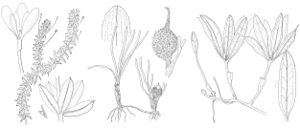Halophila
Genera Nova Madagascariensia 2. 1806.
| Taxon | Illustrator ⠉ | |
|---|---|---|
 | Hydrilla verticillata Thalassia testudinum Halophila engelmannii | John Myers John Myers John Myers |
Plants of marine waters. Rhizomes present; leaf-bearing branches arising from rhizome at each node; stolons absent. Erect stems, if present, rooted in substrate, unbranched, short; scales 2, midway or higher on stem. Leaves 2–8, terminal pairs or pseudowhorls [distichous], submersed, sessile or petiolate; blade linear to ovate, base tapering to stem; apex obtuse; midvein without lacunae along side (s), blade uniform in color throughout; abaxial surfacely without prickles; intravaginal squamules entire. Inflorescences 1-flowered or cymose, sessile; spathes not winged. Flowers unisexual, staminate and pistillate on same plants or on different plants, submersed, sessile, nearly sessile (pistillate), or pedicellate (staminate); petals absent. Staminate flowers: filaments distinct; anthers linear to fusiform; pollen in moniliform chains. Pistillate flowers: ovary 1-locular; styles 3–5, not 2-fid. Fruits ovoid to spheric, smooth or ridged, not echinate, dehiscing by decay of pericarp. Seeds spheric or nearly so, echinate to reticulate.
Distribution
North America, Central America, South America, s Europe, Asia, Africa, Australia
Discussion
Halophila baillonis Ascherson ex Dickie has been listed for the Florida Keys (R. K. Godfrey and J. W. Wooten 1979), but that species is restricted to areas south of the Keys (C. den Hartog 1970; N. J. Eiseman and C. McMillan 1980).
In addition to the three species treated here, three additional ones, Halophila aschersonii Ostenfeld, H. baillonis Ascherson ex Dickie, and H. hawaiiana Doty & Stone, have been credited to North America. These represent two taxa, neither of which approaches North America. Halophila baillonis occurs in the Caribbean Sea, and H. aschersonii is a synonym of that species. Halophila hawaiiana grows in the eastern Pacific Ocean and is known in the United States only from the Hawaiian Islands.
Species 10 (3 in the flora).
Selected References
Lower Taxa
Key
| 1 | Erect stems apparent; rhizome with 2 scales on rhizome at each node, erect stem with 2 scales on erect stem near middle; leaves in pseudowhorl at apex of erect shoot. | Halophila engelmannii |
| 1 | Erect stems very short to absent; 2 scales on rhizome at each node; leaves apparently attached to rhizome. | > 2 |
| 2 | Blade linear-lanceolate, margins entire, glabrous; staminate and pistillate flowers on different plants. | Halophila johnsonii |
| 2 | Blade oblong-elliptic, margins serrulate, pubescent; staminate and pistillate flowers on same plants. | Halophila decipiens |